Josephite Justice Network Weekend
April 3, 2020In March 2020, the Josephite Justice Network (JJN) gathered at St Joseph’s Spirituality and Education Centre in Kincumber South, New South Wales.
We were so blessed to be able to have our Josephite Justice Network gathering just before the COVID-19 lockdown crisis occurred. Thank you to all of you who were able to attend. We missed those of you who couldn’t be there. Weekend gatherings such as these are truly life-giving as we come together to learn, share our ministries and identify ways we can move forward, supporting each other and each other’s work.
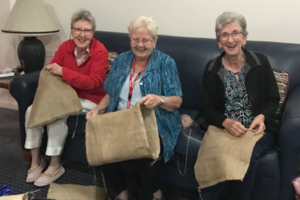 Our major theme for the weekend was “wisdom has built herself a house.” We spent the time listening to the wisdom of group members – in awe at all that’s happening around the congregations, and reflecting together on the wisdom and possibilities up for grabs!
Our major theme for the weekend was “wisdom has built herself a house.” We spent the time listening to the wisdom of group members – in awe at all that’s happening around the congregations, and reflecting together on the wisdom and possibilities up for grabs!
Sr Susan Connelly began our session revising academic theories around scapegoating. There is a real world example being lived out in the Australian Courts whereby truth-tellers, Witness K and Bernard Collaery fight for justice to have their cases dismissed. If you would like to read more about this issue and how you can support these brave men, read here.
Saturday evening saw the group gather to sew hoods to be used in the Canberra protest in support of Witness K and Bernard Collaery. It was a team building session with a purpose and an urgent message to the Attorney General to #DropTheProsecutions.
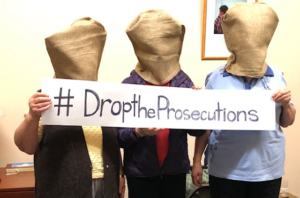 This weekend seized the opportunity for JJN members to share progress and hurdles facing us in our work. JJN participants shared many stories – of political lobbying to assist Sudanese Youth find employment; Financial counselling to release families from irresponsible lending loans in New Zealand; an update of the Sydney Alliance initiatives and the JJN membership actions; Caritas work in light of continued government aid cuts; West Papua’s freedom struggles; and First Nations projects and studies published by The Baabayn Project. A submission to the United Nations concerning the Australian Government’s human rights agenda over the past 4 years has also been prepared and edited by the JJN group.
This weekend seized the opportunity for JJN members to share progress and hurdles facing us in our work. JJN participants shared many stories – of political lobbying to assist Sudanese Youth find employment; Financial counselling to release families from irresponsible lending loans in New Zealand; an update of the Sydney Alliance initiatives and the JJN membership actions; Caritas work in light of continued government aid cuts; West Papua’s freedom struggles; and First Nations projects and studies published by The Baabayn Project. A submission to the United Nations concerning the Australian Government’s human rights agenda over the past 4 years has also been prepared and edited by the JJN group.
Finally, as an alternative to our current anthem we shared, in prayer, a more inclusive and reconciliatory Anthem for all Australians. You may like to view and share this offering here.
Wisdom was shared and it is abundantly evident that our houses are blessed with the people we work with, so that we might influence changes necessary to ensure that all people can live a life of dignity. Surely there will be much to share next time we meet.
We are investigating ways we can continue to come together while adhering to our responsibilities according to COVID-19 restrictions. However, in the meantime, let us keep each other in mind and heart. Let us all rejoice in our work that gifts us the wisdom to build a house that is a kingdom for all.
Karen Oxley
Volunteers Coordinator – Josephite Justice Network
P.S. Save the Date for a FREE fun-filled night of entertainment – Josephites Got Talent! We have to have something to look forward to… right? View a promotion video for Josephites Got Talent here.
View more photos from the JJN weekend in the gallery below:
Our Precious Earth is in Need of Our Protection
April 2, 2020While watching Q+A recently I was inspired by the statement:
 I began creating the sculpture with the conviction that healing our broken and wounded Earth depends on us now, one with all vulnerable species, to “learn the way forward from the First Peoples of all our countries” (27th General Chapter, Sisters of Saint Joseph of the Sacred Heart. October 2020).
I began creating the sculpture with the conviction that healing our broken and wounded Earth depends on us now, one with all vulnerable species, to “learn the way forward from the First Peoples of all our countries” (27th General Chapter, Sisters of Saint Joseph of the Sacred Heart. October 2020).
People from every country across the world are bearing witness to the death of their loved ones. This pandemic is bringing us closer on a global scale as we are all in this place and space together. The virus that is taking our breath away is also awakening our evolving consciousness to our common humanity.
Aboriginal culture calls us to Ngapartji Ngapartj – a reciprocal kindness and absolute obligation to each other. We receive from Earth and we are seriously obligated to pay back in kind… Ngaparti Ngaparti.
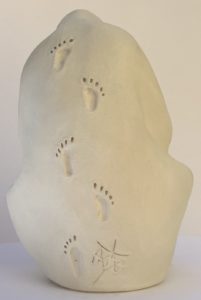 In the sculpture we all share the protective mantle of Earth protecting all life. The pouch, water font and/or chalice shape in our lap depicts our growing consciousness that divinity is within us, and within our shared humanity. We hold all creation in God’s love. Communion is Holy and is the only way forward.
In the sculpture we all share the protective mantle of Earth protecting all life. The pouch, water font and/or chalice shape in our lap depicts our growing consciousness that divinity is within us, and within our shared humanity. We hold all creation in God’s love. Communion is Holy and is the only way forward.
The heart image behind Earth represents our Sacred Heart. The footprints on the back invite us all to ‘learn the way forward from the First Peoples from all our countries’… the First Peoples who held Earth gently, and tenderly cared for her and all living creatures for thousands of years.
Together let us unite and act “on new possibilities, wherever we are that will heal, include, untether, set right and serve” (27th General Chapter, Sisters of Saint Joseph of the Sacred Heart. October 2020
Kenise Neill rsj
Earth Hour 2020
March 28, 2020Earth Hour Saturday 28 March 2020.
 Earth Hour was begun in Sydney in 2007 and has spread as the largest world movement working for climate change. We turn off our lights 8.30-9.30 pm local time with millions of people around the world in 7,000 cities in 180 countries and territories as a pledge to help fight for our planet. The amount of electricity we save is not the main issue. It’s the statement that our action makes that matters, the conviction in our hearts that such an action makes visible.
Earth Hour was begun in Sydney in 2007 and has spread as the largest world movement working for climate change. We turn off our lights 8.30-9.30 pm local time with millions of people around the world in 7,000 cities in 180 countries and territories as a pledge to help fight for our planet. The amount of electricity we save is not the main issue. It’s the statement that our action makes that matters, the conviction in our hearts that such an action makes visible.
Laudato si’ (LS) offers some motivation for the exercise. Pope Francis suggests:
 I wonder could we use the hour to reflect on our efforts to measure and reduce our personal carbon footprint. You can download a carbon calculator free. Does using my iPad negate turning off lights?
I wonder could we use the hour to reflect on our efforts to measure and reduce our personal carbon footprint. You can download a carbon calculator free. Does using my iPad negate turning off lights?
Or we could invite some friends over and use the hour to chat about our efforts to reduce-reuse-recycle, or the latest article or podcast on earth care or Pope Francis’ final chapter in Laudato si’ where he appeals to us to consider a covenant between humanity and the environment. LS Ch. 6, part 2. We could consider, as Francis suggests:
Francis continues:
Maybe star gazing could help to fill the hour!
Francis suggests then that what we:
The whole of Chapter 6 of Laudate Si makes beautiful and challenging reading to encourage us to participate in EARTH HOUR. Towards the end Pope Francis encourages us:
Let’s spend EARTH HOUR celebrating and perhaps singing of the joy of our hope with the millions of others who share our concern for our “common home”.
Photo: Landscape photo of mountian with polar lights by Lucas Ettore Chiereguini obtained from Pexels. Used with permission.
Photo: Planet Earth close up by Pixabay obtained from Pexels. Used with permission.
Junior Joeys Making a Difference in Tassie
March 27, 2020Junior Joeys from Sacred Heart School, Ulverstone and Our Lady of Lourdes School, Devonport came together recently at MacKillop Hill, Forth.
 Facilitated by Sr Carmel Jones, the 35 Grades 5 and 6 students learnt more about Saint Mary MacKillop, Father Julian Tenison Woods and the Sisters of Saint Joseph. Through interactive activities, they reflected on how important Saint Joseph is in the Josephite story, pondered in nature like Father Julian and chose Mary MacKillop quotes that really spoke to them about their role in their school communities in 2020.
Facilitated by Sr Carmel Jones, the 35 Grades 5 and 6 students learnt more about Saint Mary MacKillop, Father Julian Tenison Woods and the Sisters of Saint Joseph. Through interactive activities, they reflected on how important Saint Joseph is in the Josephite story, pondered in nature like Father Julian and chose Mary MacKillop quotes that really spoke to them about their role in their school communities in 2020.
Taking as their theme Never see a need without doing something about it, considerable time was spent planning activities across the year. Many creative ideas emerged, from assisting those who might just need a smile or a word of encouragement to fundraising for community projects. It was wonderful to work with such an enthusiastic and responsive group of boys and girls who are committed to making a difference in their school communities as Junior Joeys for the next twelve months.
It was a great day and we are looking forward to our role as Junior Joeys.
Since this day Junior Joeys at Our Lady of Lourdes have responded to the current pandemic by holding a Feel Good Friday. This involves encouraging students to wear casual clothes and organising activity songs to be broadcast into classrooms during the day.
There are a number of Catholic schools in the Josephite tradition across Tasmania who have established Junior Joey groups or who are in the process of forming groups for the first time.
Carmel Jones rsj
(Since writing this article, it is noted that Junior Joey activities may well be curtailed due to school closures. However, congratulations to Junior Joeys for such a positive start to 2020!)
Opening of Mary MacKillop Place Museum 1995
March 26, 2020On 26 March we celebrate the 25th anniversary of the opening of Mary MacKillop Place Museum.

Over four years had passed since notifications from the fire department, the water department, pest control and building advisers prompted the necessary renovation of the whole complex of the Mother House, 7 – 9 Mount Street, North Sydney. Around the same time, the Congregation had been advised of the imminent beatification of Mary MacKillop. A Secretariat to prepare Australia for the latter event was formed and a process of consultation about the future of the Mount Street site was launched. One proposal being mooted was that we should sell the property and relocate the Mother House to a more Josephite i.e. underprivileged area. It was a group of Aboriginal people who informed us that this was Mary MacKillop’s place – she had lived and died here, this was where her mortal remains were buried, here her spirit lived on, and there was no way any of this could be re-located.
During her lifetime, Mary MacKillop had been the instrument through whom God had given a sign of compassionate love to our world. Over the years, it had become obvious that God was still working through her. Hundreds of people were visiting her chapel and tomb each week and in recent times they had regularly squeezed through narrow passages to view the Mary MacKillop artefacts that were on display in a small room near the administration offices. It was our job, surely, to facilitate what God was continuing to do, by providing a safe and contemporary environment so that pilgrims could experience God’s message made through Mary MacKillop for our times.
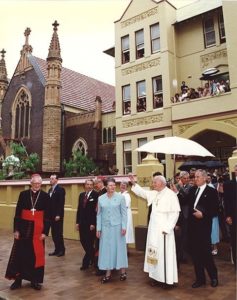
Helped by financial opportunities afforded by “the recession we had to have” and the generosity of wonderful people, we were able to embark on the complete repair of condemned buildings and the replacement of facilities. What is now the central area of the Museum was entirely gutted and reconstructed. Our advisers told us we must aim for the best and through their guidance we were able to engage at nominal rates the services of first-class technicians, artists, writers and other experts needed to set up such a venture.
This was to be a museum with a difference. Not only would it display objects and tell the story of Mary MacKillop but it would involve visitors in the story of how God works in all our lives to bring goodness into being. We hoped that everyone who would come to this place would leave inspired and energised. The focus would be on the pilgrim People of God:
The message would be addressed to people of all ages, relating to mid-primary-aged children as well as to adults. Some museums at that time demanded a lot of reading but this one would instead engage a variety of senses i.e. touch, hearing, sight and even action. It would to be alive.
By the end of 1994 all was ready. Before the Beatification on 19 January 1995, we had had Open Days where Sisters and other friends could sample what the Museum had to offer and try it out. While the hope had been that Pope John Paul II could at least put his foot inside the building, authorities told us that the security required and the precision of his itinerary would not make this possible. However his route during the Mount Street visit could incorporate walking past the Museum and blessing it from the outside. The Pope prayed, then, for all who would come here as pilgrims, and that God’s grace would envelop this place.
My diary entry for 22 January, three days after the Beatification, reads simply: “Opening of Mary MacKillop Place. Steady stream of people all day.” A highlight for me was when I went over to the coffee shop to see how things were going. I noticed a woman sitting at a table, tears streaming into her cup. I sat beside her and quietly asked if she was okay. She told me then of an argument she had had with a priest many years ago and therefore had left the Catholic church. “But, Sister,” she said, “going around today I’ve realised that Mary MacKillop could keep her faith no matter what priests or bishops or anyone else threw at her. If she could do it, so can I.” I came away from that encounter musing to myself, “If nothing else ever happens here, it’s been worth it all.”
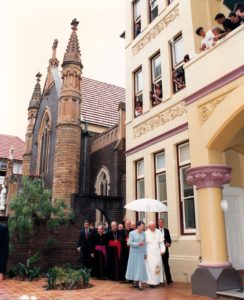
The opening of Mary MacKillop Place was a beginning and an ending. It was the end of a long journey that had involved setting a vision, drawing up policies, engaging personnel, dealing with legal and professional requirements, ensuring fiscal and human resources and above all, taking the risk that God would provide for its future at a time when many people thirst for spiritual nourishment. It was the beginning of another journey that continues to this day. About ten years after it had opened, I met a man who approached me as he was leaving the Museum and asked if I were a Sister connected with it. He then explained he was from England; he was not a Catholic but had heard of the Museum in his travels. “Sister, I want to tell you”, he said, “that this place is world-class. It has something I’ve never come across before, and you should make sure that everyone knows about it. It’s a real spiritual treasure.”
For Mary MacKillop Place to be known around the world is indeed a wonder. The wonder is that God continues to work in this place. Indeed, the place would be nothing if it weren’t for the people who are part of it. They are the witnesses of a God who worked through Mary MacKillop and who now works through them. I thank God for them and rejoice that what began as a problem with leaking pipes, broken walls, rising dampness, white ants and tinder-dry, unsafe housing has evolved into a ministry that throbs with vibrancy and meaning.
Mary Cresp rsj
Former Congregational Leader, 1990 – 1996
Prayers for these Challenging Times
March 20, 2020A Selection of Prayers to help you through our Current Challenging Times.
God of expansive and faithful love, giver and sustainer of life,
You know the depths of our pain as we journey through
this time of unknowing.
Hear our voices and the cry of our hearts.
Guide us to see the most life-giving ways open to us.
St Joseph,
Man of courage, you protected Mary and Jesus when they were in danger.
Cradle us now safely in this same protecting embrace.
May we, like you, extend this care to our world that is in need.
St Mary of the Cross,
you faced difficult times with a heart filled with trust,
always believing in the watchful presence of God.
Walk with us now in this difficult time,
and may we be for others, examples of hope and trust.
St Joseph, and St Mary of the Cross pray with us in this time of need. Amen.
God has said: “I will never leave you or forsake you.”
So we may say with confidence,
“God is my Helper, and I will not be afraid.”
Hebrew 13:5-6
Annie Bond rsj
Sisters of Saint Joseph of the Sacred Heart
Almighty and all-merciful God,
lover of the human race, healer of all our wounds,
in whom there is no shadow of death,
save us in this time of crisis;
grant wisdom and courage to our leaders;
watch over all medical people
as they tend the sick and work for a cure;
stir in us a sense of solidarity beyond all isolation;
if our doors are closed, let our hearts be open.
By the power of your love destroy the virus of fear,
that hope may never die
and the light of Easter, the triumph of life,
may shine upon us and the whole world.
Through Jesus Christ, the Lord risen from the dead,
who lives and reigns for ever and ever.
Amen.
Holy Mary, health of the sick, pray for us.
St Joseph, guardian of us all, pray for us.
The Most Reverend Mark Coleridge
Archbishop of Brisbane
Gracious God,
We give thanks anew for your providence and presence.
We prayerfully seek your grace, amidst COVID-19 here and overseas.
We pray for those in need of healing.
We pray for your peace with those who are anxious or grieving.
We pray you will continue to strengthen and sustain
all those who are serving in response.
We pray for your Holy Spirit’s discernment
amidst the many choices and decisions
facing our national, community and medical leaders.
We pray we each might see quickly what more we can do
to help those who are vulnerable.
This prayer for our nation in the family of nations,
with all that is on our hearts,
we gather now and pray
through Jesus Christ our Lord.
Amen.
Ecumenical Prayer from the National Council of Churches
Please find a Prayer to Saint Joseph from the Catholic Archdiocese of Melbourne below:
Do not lose hope; St Joseph also experienced moments of difficulty, but he never lost faith and was able to overcome them, in the certainty that God never abandons us.
Thumbnail image: Person in brown jacket by Ümit Bulut obtained on Unsplash. Used with permission.
A Day of Worldwide Solidarity and Prayer
A Day of Worldwide Solidarity and Prayer in this time of COVID-19
The International Union of Superiors General (UISG) has called upon all women religious throughout the planet to spend Sunday, 22 March as a Day of Worldwide Solidarity and Prayer.
 Leadership Conference of Women Religious (LCWR) encourages all leaders to ask their members to join intentionally their own prayer with Catholic sisters throughout the world who will also be praying for those directly impacted by this crisis. Through the mystery of God, may this action of solidarity contribute in some way to an increase in healing, compassion, and love throughout the planet.
Leadership Conference of Women Religious (LCWR) encourages all leaders to ask their members to join intentionally their own prayer with Catholic sisters throughout the world who will also be praying for those directly impacted by this crisis. Through the mystery of God, may this action of solidarity contribute in some way to an increase in healing, compassion, and love throughout the planet.
As Catholic Religious Australia (CRA), dedicated to the service of religious life in Australia, may we suggest that all religious institutes inform their members that this coming Sunday is a Day of Worldwide Solidarity and Prayer and ask them to place the good of our planet at the heart of their day’s prayer.
Sharon Price rsm
Transition Manager, CRA
Image: Women praying beside tree by Ben White obtained from Unsplash. Used with permission.
Mount St. Joseph Girls’ College Celebrates Governance Change
Late last year, the Sisters of Saint Joseph of the Sacred Heart transferred the governance of Mount St. Joseph Girls’ College (MSJ) to the Archdiocese of Melbourne.
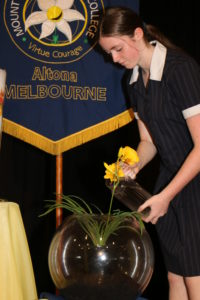
On 11 February this year, the College, led by Fr John Healy, hosted a beautiful Opening of the College Year Mass. Attending with the College staff and students were many past Principals, founding teachers, Board members and other Josephite community representatives. Thanksgiving and gratitude was expressed to the Sisters of Saint Joseph as their legacy in establishing the College in 1964 was celebrated. From small beginnings, the College now has a student enrolment of over 1000.
Although the Sisters no longer are the governing body for the College, their influence, and the Josephite charism, will remain an integral and the Sisters no longer are the governing body for the College, their influence, and the Josephite charism, will remain an integral and important part of College life. Day-to-day teaching and learning continues on as before and Sisters are welcomed at every opportunity into College activities.
Following the Mass, Sisters were presented with bunches of white lilies and invited to lunch with staff and student leaders. A tour of the College was also organised to showcase with pride all that has changed since 1964.
MSJ is very proud of its Josephite heritage – and the Sisters of Saint Joseph are very proud of all that continues to be achieved at MSJ!
Nicole Magee
Marketing & Communications
Mount St. Joseph Girls’ College
Altona West
View a photo gallery and video below:
